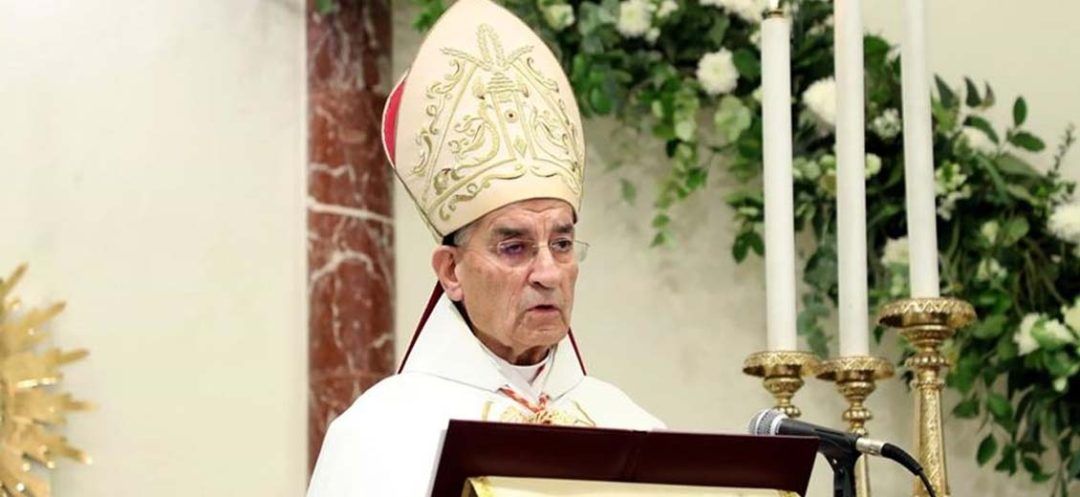- Home
- War in the Middle East
- Rai: We Don't Want to Be Scapegoats for a Culture of Death

More and more voices are being raised in Lebanon to denounce Hezbollah's actions, whose policy is based on "Iran and the resistance first" and "whatever is good for the resistance is good for Lebanon."
During his Sunday sermon in Bkerke, Maronite Patriarch Bechara al-Rai condemned the murderous and destructive venture into which the pro-Iranian formation has dragged the Lebanese, despite themselves, "to support Hamas in the face of Israel."
"Allow me to say it loud and clear: we refuse to be hostages, human shields and scapegoats for Lebanon's failed policies and a culture of death that has brought Lebanon nothing but fictitious victories and huge defeats," Rai said, while reading an excerpt from a letter sent by a resident of one of the villages on the border strip. This was a thinly veiled reference to the devastating war of 2006, instigated by Hezbollah, which later claimed a "divine victory." At the time, the party's leader Hassan Nasrallah used these grotesque words to justify the motives behind the war, which left 1,200 dead, more than 4,000 wounded and a million displaced, not to mention the destruction of Lebanon's infrastructure: "To defeat the project of a great Israeli state."
The Lebanese now fear that history is repeating itself. "They write to us, 'We are under psychological pressure because of the war, and our nerves are shattered by the horror of daily raids and the sound of shells. Our children are deprived of entertainment and education because schools had to close,'" the Patriarch continued, reading the contents of the same letter.
"The inhabitants of the border villages shared with us their pain at the state's failure to fulfill its duties and responsibilities towards them, and at the extent of the chaos and anxiety resulting from this bitter reality," the Patriarch lamented
He recalled that "the role of the State and of those in key official positions is to serve citizens by providing them with the means for a decent life and personal development." He expressed his "dismay at seeing the Lebanese people in a state of humiliation, poverty and social, economic and financial regression."
"This is not surprising, however," Rai added, "given the fact that our state, in the absence of a president, has fallen prey to the corrupt who are doing everything they can to prevent the election of a president, to give themselves more time to undermine the state's finances and institutions. They create chaos that allows influential parties to impose what is illegal, thanks to their excessive power," he said, in what appears to be a direct accusation against Hezbollah.
Finally, the Maronite Patriarch strongly condemned "the closure of land registries in Mount Lebanon under the pretext of arresting some of their employees, while citizens' work is disrupted."
As is the case whenever Rai refers to Hezbollah and its actions in his sermons, the Jaafari Mufti, Sheikh Ahmad Kabalan, unofficial spokesman for Amal and Hezbollah, swiftly replied to "certain leaders," saying it was "shameful to attack those who sacrifice themselves for the country and its people."
In a lengthy tirade paying tribute to Hezbollah, he also responded to criticism about the "culture of death," saying it is usually uttered by "those who do not care about the country, its sovereignty, the slaughter of a people and the commandments of heaven."
During his Sunday sermon in Bkerke, Maronite Patriarch Bechara al-Rai condemned the murderous and destructive venture into which the pro-Iranian formation has dragged the Lebanese, despite themselves, "to support Hamas in the face of Israel."
"Allow me to say it loud and clear: we refuse to be hostages, human shields and scapegoats for Lebanon's failed policies and a culture of death that has brought Lebanon nothing but fictitious victories and huge defeats," Rai said, while reading an excerpt from a letter sent by a resident of one of the villages on the border strip. This was a thinly veiled reference to the devastating war of 2006, instigated by Hezbollah, which later claimed a "divine victory." At the time, the party's leader Hassan Nasrallah used these grotesque words to justify the motives behind the war, which left 1,200 dead, more than 4,000 wounded and a million displaced, not to mention the destruction of Lebanon's infrastructure: "To defeat the project of a great Israeli state."
The Lebanese now fear that history is repeating itself. "They write to us, 'We are under psychological pressure because of the war, and our nerves are shattered by the horror of daily raids and the sound of shells. Our children are deprived of entertainment and education because schools had to close,'" the Patriarch continued, reading the contents of the same letter.
"The inhabitants of the border villages shared with us their pain at the state's failure to fulfill its duties and responsibilities towards them, and at the extent of the chaos and anxiety resulting from this bitter reality," the Patriarch lamented
He recalled that "the role of the State and of those in key official positions is to serve citizens by providing them with the means for a decent life and personal development." He expressed his "dismay at seeing the Lebanese people in a state of humiliation, poverty and social, economic and financial regression."
"This is not surprising, however," Rai added, "given the fact that our state, in the absence of a president, has fallen prey to the corrupt who are doing everything they can to prevent the election of a president, to give themselves more time to undermine the state's finances and institutions. They create chaos that allows influential parties to impose what is illegal, thanks to their excessive power," he said, in what appears to be a direct accusation against Hezbollah.
Finally, the Maronite Patriarch strongly condemned "the closure of land registries in Mount Lebanon under the pretext of arresting some of their employees, while citizens' work is disrupted."
As is the case whenever Rai refers to Hezbollah and its actions in his sermons, the Jaafari Mufti, Sheikh Ahmad Kabalan, unofficial spokesman for Amal and Hezbollah, swiftly replied to "certain leaders," saying it was "shameful to attack those who sacrifice themselves for the country and its people."
In a lengthy tirade paying tribute to Hezbollah, he also responded to criticism about the "culture of death," saying it is usually uttered by "those who do not care about the country, its sovereignty, the slaughter of a people and the commandments of heaven."
Read more



Comments